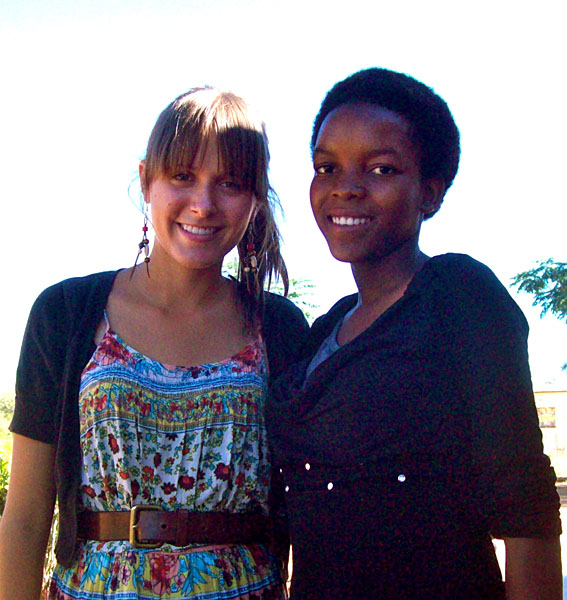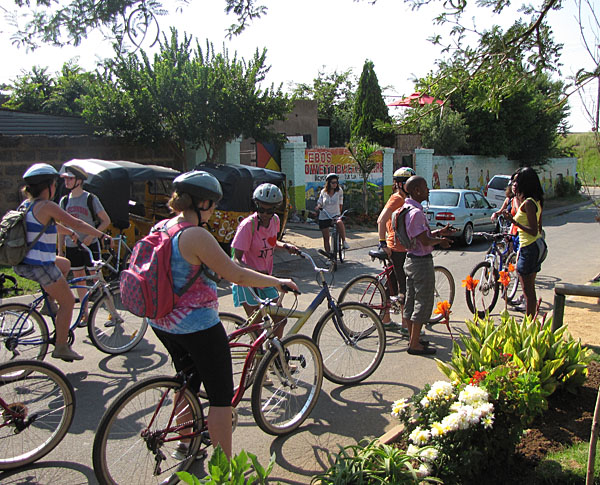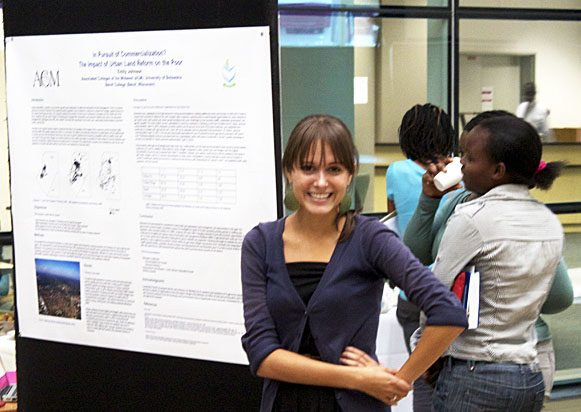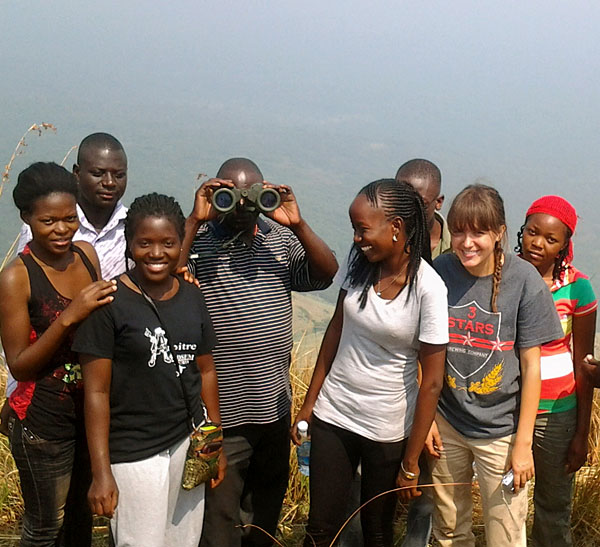When Beloit College student Emily Johnson submitted her senior thesis to the Journal of Undergraduate International Studies for publication, she had to edit it to fit within the journal’s page requirements.
“I cut out the boring stuff,” she joked, and her research paper on the politics of land policy formulation in Uganda and Botswana was one of seven papers published in the journal’s Spring 2013 issue.
 Emily Johnson (left) with her host sister during the Botswana Program’s weekend home stay in the village of Mochudi.
Emily Johnson (left) with her host sister during the Botswana Program’s weekend home stay in the village of Mochudi.
Photo courtesy of Emily Johnson
Looking at all that Johnson has done this year, there’s not much “boring stuff” to be found. Along with being published, she graduated from Beloit, was awarded one of the college’s prestigious Weissberg Fellowships, and in June took off to East Africa to work on a U.S. Agency for International Development (USAID) project in Uganda.
Johnson’s passion for research and for learning about Africa and development issues is evident, and she said that participating in the ACM Botswana Program was a pivotal experience.
Her interest in Africa was piqued in a couple of courses she took at Beloit with Professor Rachel Ellett, a political scientist who later was her senior thesis advisor. Johnson spent her entire junior year studying abroad in Africa, first on a fall program in Uganda and then in Botswana for the spring semester.
“I loved the balance of the ACM program,” said Johnson. “It was an academically rigorous and research-intensive program, so I chose to invest myself in the fieldwork that I was doing. But there were other really cool things, too.”
Johnson had an internship with a community group – she’s remained in contact with the people she worked with there – and program excursions took the students to places such as the Okavango Delta and Soweto, South Africa.
 Students prepare to begin a bike tour during the Botswana Program excursion in South Africa.
Students prepare to begin a bike tour during the Botswana Program excursion in South Africa.
Photo courtesy of Bill Moseley
“So much of what we were learning in class about conservation and community-based natural resource management, you saw firsthand [on the field trips],” she said. “So I feel like the coursework and having classes with the same people who went on the excursions with you enabled a better discussion throughout the semester.”
The program’s Faculty Program Director that year was Bill Moseley, Professor of Geography and Director of African Studies at Macalester College, who taught a course on the environment and development in Botswana and guided the students in their independent study projects.
For her project, Johnson chose to focus on the politics of land policy in and around Botswana’s capital, Gaborone, where the program is located. Political negotiations over land reform in the city and nearby rural areas were going on at the time, Johnson noted, and she interviewed a variety of bureaucrats, ministers on land boards, and experts at the University of Botswana.
“I discovered that conflict around Gaborone was not solely about land, but was rooted in historical struggles between the rich and poor, urban and rural, and traditional and political elites,” Johnson noted. “My fascination with land and politics then led me to write a senior thesis [at Beloit] that utilized land policy formulation as a lens to analyze greater political struggles between vying elites in sub-Saharan Africa.”
 Emily Johnson presenting her independent study project during a poster session at the University of Botswana.
Emily Johnson presenting her independent study project during a poster session at the University of Botswana.
Photo courtesy of Firas Suqi
“I can’t emphasize enough how much my senior thesis was an extension of the initial fieldwork I conducted in Botswana,” she said. “I was able to use some of the contacts I had made in Botswana and some of the interviews I had done there in my thesis.”
The experience in Botswana and her continuing research the following year, Johnson said, “made me realize that land tenure reform and the politics of how people make the land policies is a really, really fascinating and overlooked process.” It also made her determined to return to Africa after graduating this past May.
Johnson was chosen for one of five Weissberg Fellowships, a Beloit program that provides support to encourage the college’s alumni who are pursuing careers related to human rights. She started networking to line up an internship or position with an organization in sub-Saharan Africa.
“Someone I had met doing research put me in contact with the head of a USAID project called Tourism for Biodiversity that the Jane Goodall Institute is implementing at a couple of forest reserves in Uganda,” said Johnson. Her task has been to carry out a baseline survey of about 500 households in western Uganda, traveling from village to village and coordinating with locally-based staff.
 Emily Johnson and a group of field assistants she worked with on the USAID project in Uganda.
Emily Johnson and a group of field assistants she worked with on the USAID project in Uganda.
Photo courtesy of Emily Johnson
“They’ve given me an enormous degree of responsibility,” she said. “I hired a team of field assistants, taught them how to do data entry, and analyzed all the data using a statistical software program. I’ve been responsible for conducting an evaluation and writing the reports, and I’ve gotten to use GIS and mapped existing and proposed hiking trails in these forests that are funded through the project.”
Johnson doesn’t know yet what 2014 will bring, though she almost certainly will be returning to East Africa. At this moment, she’s back home in Washington, DC for a visit and is waiting to hear whether funding will come through to support a second year of the Tourism for Biodiversity project.
Looking further ahead, Johnson said, “I really want to work for an NGO [non-governmental organization] that’s committed to rigorous research. There are a number of organizations in Uganda that are testing what works in development and scaling those interventions up.” As examples, she pointed to projects that work with loans and loan services or that test ways to improve water sanitation and hygiene.
“Research is something that’s brought together all of my experiences in sub-Saharan Africa,” said Johnson. “I love learning and talking and interacting with people. I guess it’s [because of] my love for fieldwork that I see continuing to work with an organization that values scaling up and finding out what works. That’s my dream job.”
Links:
- Botswana: Development in Southern Africa
- Emily Johnson’s paper (see p. 72) in the Spring 2013 edition of the Journal of Undergraduate International Studies
- Poster presentation of Emily Johnson’s independent study project on the Botswana Program









